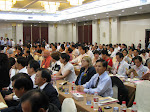
The
Anji economic development zone was approved as a provincial level zone in 1994, and is a center for ecology-oriented county development.
Anji , also known as the Land of White Tea, is home to China's largest bamboo exposition park, at which many scenes for "Crouching Tiger, Hidden Dragon" were filmed. We met the local economic development officials, who led us on a tour of a couple of industrial parks and then to a chair manufacturing facility. We learned there are several chair manufacturing enterprises in
Anji. The picture to the left shows John Barber and Mark
Ehrhardt talking to the general manager of the facility in a showroom in which were displayed hundreds of office chairs, as well as easy chairs, recliners, and couches.

After the tour, we drove to the Sunny Holiday Resort for a formal meeting with
Anji government and development zone officials. The resort and meeting room were nicer than any of the meeting rooms we'd experienced so far on the trip. As with most formal meetings, each person at the table was given a bottle of water and a cup of hot tea. As you can see from the picture, they hung a special banner welcoming us to the meeting. At least that is what we assumed it said... From l. to r., Mr. Huang, a local business owner;
Ruilin Yan, deputy director of the
Anji Foreign Trade & Economic Cooperation Bureau;
Yenan Zhu, director of the
Zhejiang Anji Economic Development Zone; Lucille, Mary, John,
Jinshui, Mark; and
Hu Liu Sun, director of the Overseas Chinese Affairs Office of
Huzhou. As you can also see, there was fresh fruit & vegetables on the table, along with fresh flowers. This is typical of most of the meetings we attended in
Huzhou.
The order of the meeting followed a pattern that would repeat in most meetings to follow. The number one host went first, introducing everyone on his side of the table, then providing an overview of the economic development in the area. He called on the important attendees, one by one, giving them a chance to introduce their area of interest. Then he invited me or
Jinshui to introduce the members of the
SBDC delegation. I provided an overview of the
SBDC,
Jinshui described the International Business Development Program, Lucille talked about the
Farmingdale regional center, and John Barber talked about Evergreen Timber and his intention to do business with some Chinese companies. Then we talked about common goals and working together for mutual success. We invited them to visit the
SBDC in Albany and to meet some New York businesses. They invited us to return to
Anji in the near future. Then we exchanged gifts. A nice luncheon followed, featuring bamboo (cooked) and bamboo juice, two specialties of the region.
 Did you know that there are several hundred varieties of bamboo? It was new information for me. We learned that 75% of Anji county is covered with vegetation and 71% is forested; there is a lot of bamboo. After lunch at the Sunny Holiday Resort, our hosts took us to the China Bamboo Museum to learn more about the plant we had heard about in our meeting. "With a variety of bamboo species, Anji has actually become the largest bamboo growing and research base in Asia," said an official with Anji County Government, " the bamboo museum ... can not only satisfy the demand of systematical research, but also provide knowledge on the history and culture of bamboo growing
Did you know that there are several hundred varieties of bamboo? It was new information for me. We learned that 75% of Anji county is covered with vegetation and 71% is forested; there is a lot of bamboo. After lunch at the Sunny Holiday Resort, our hosts took us to the China Bamboo Museum to learn more about the plant we had heard about in our meeting. "With a variety of bamboo species, Anji has actually become the largest bamboo growing and research base in Asia," said an official with Anji County Government, " the bamboo museum ... can not only satisfy the demand of systematical research, but also provide knowledge on the history and culture of bamboo growing  and bamboo arts and crafts for an increasing number of tourists." As you can imagine, much of the bamboo grown in Anji is used to produce flooring, furniture, and other products for sale in China. Anji products are now exported to more than 20 countries and regions, and about one-fourth of the county's gross output value of agriculture and industry comes from bamboo-related industries. Here are Mark and John, the Evergreen Timber guys, standing in front of some of the bamboo we saw.
and bamboo arts and crafts for an increasing number of tourists." As you can imagine, much of the bamboo grown in Anji is used to produce flooring, furniture, and other products for sale in China. Anji products are now exported to more than 20 countries and regions, and about one-fourth of the county's gross output value of agriculture and industry comes from bamboo-related industries. Here are Mark and John, the Evergreen Timber guys, standing in front of some of the bamboo we saw.











